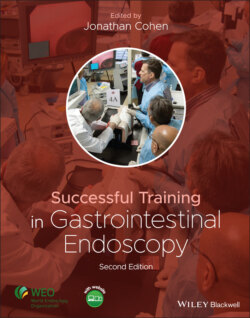Читать книгу Successful Training in Gastrointestinal Endoscopy - Группа авторов - Страница 66
Training environment
ОглавлениеThe development of expertise in endoscopy requires extensive, sustained practice of the requisite skills as well as acquisition of the relevant knowledge and attitudinal and behavioral aspects (i.e., endoscopic nontechnical [5] or integrative skills [6] and “scopemanship” [7]) required to produce competent endoscopists. Expertise development is dependent not only on the quantity of time spent training, but also on training quality as well as trainee commitment and engagement. Central to this is the need for an effective training environment and culture. Endoscopic training needs to be accepted, supported, encouraged, and prioritized at an institutional level, particularly given the multiple competing priorities inherent in clinical care and the barriers to implementing change that often arise.
Training units require sufficient procedural volumes to ensure adequate training opportunities for trainees and trainers with interest and skill in teaching endoscopy [8]. Buy‐in and support from leadership is essential to ensure that trainers have dedicated time for endoscopy training and accompanying assessment, and that interprofessional team members, including nurses and managers, are engaged and committed to delivering high‐quality training. It is also important for training programs and institutions to develop policies and systems to support endoscopy education. For example, it is crucial to have a specified plan to ensure that trainers receive adequate education and are competent to undertake a trainer role. Designation of an endoscopy training lead can be beneficial to help create an environment and culture that recognize endoscopy training as a core component of service provision. Responsibilities of such leads can include allocation of training lists, trainee orientation, delivery of the endoscopy training curriculum, and review of trainee assessment portfolios to develop personalized learning plans.
Any change in training provision and culture must be done in a concerted manner and be supported with sufficient resources. As trainee presence leads to longer procedure times and negatively impacts case throughput and endoscopist billing [9–11], dedicated training lists (or portions of lists) are the best way to ensure that trainees receive adequate exposure and practice and that trainers have sufficient time to focus on the needs of trainees. Resources and infrastructure are also required to help collate feedback and assessment data from both trainees and trainers and ensure that it is acted on. Additionally, support is required to purchase training aids, such as magnetic endoscopic imagers and endoscopic simulators which, as discussed later in this chapter, can be of benefit in endoscopy training.
